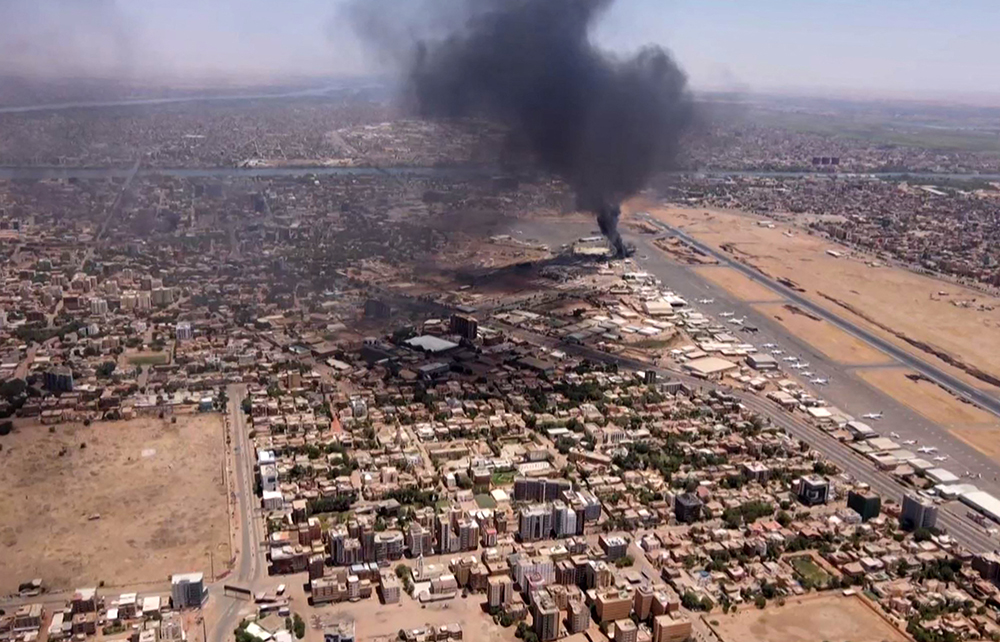The fiasco in Khartoum is being widely interpreted as a tragic failure of intelligence. James Cleverly, the Foreign Secretary, is facing questions about how and why the government was caught unawares as Sudan descended into bloody chaos. There are bodies on the streets of Khartoum, foreigners have fled the city, and those who remain are braced for a resumption of war. A United Nations-brokered truce turned out to be illusory.
It is tempting to think of diplomats as an unnecessary luxury in the 21st century, but they are vital
The British military managed to evacuate about 100 diplomatic staff but most of the estimated 4,000 British nationals remain in a place that evokes the mayhem of the panicked evacuation of Kabul. The first RAF flights that arrived in Cyprus carried only a few dozen civilians.
The US state department was also caught by surprise. The army has evacuated diplomatic staff but left 16,000 US citizens in Khartoum. Meanwhile the EU says one of its diplomats has been shot, although not critically injured.
Most countries are making desperate attempts to escalate their evacuation plans. British citizens are being flown to Cyprus. There are attempts to establish an escape route by sea from Port Sudan on the Red Sea coast. But all this is too little too late. Cash-strapped governments have relied on the convenient assumption that the post-Cold War world was predictable and manageable, and that it made sense to reduce military and diplomatic budgets. This has been shown repeatedly to have been a foolish assumption.
It would be a mistake, however, to imagine that our government could or should have predicted the fall of Khartoum. It is clear from the number of countries trying to evacuate their citizens from the capital that no one saw the civil war coming. Dozens of private companies were also taken by surprise. Indeed, almost no one imagined that the military junta ruling the country would suddenly disintegrate into factional warfare; that an argument between generals would blow up into fighting in the streets.
As Karl Popper observed, the fact that we can predict eclipses of the sun and moon does not mean we can predict revolutions. People do not behave like planetary and extra-planetary bodies. The fall of the Soviet Union astonished Sovietologists; the Arab Spring uprisings blindsided many in the Middle East.
But while we can’t blame politicians for not foreseeing any particular event, we can criticise them for the failure to prepare for crises in general. Instead of assuming a peaceful trajectory and cutting back the Diplomatic Service, the government should have accepted that we live in unpredictable times and need to invest in the wherewithal to find out information and respond to it quickly.
The scenes unfolding in Khartoum demonstrate the danger of chipping away at the Foreign Office. The UK has a strong track record in producing diplomats of a high quality: our Diplomatic Service is envied abroad. It is tempting to think of diplomats as an unnecessary luxury in the 21st century. Yet they are vital for any country that aspires to have influence in the world. We need officials who can represent the interests of British citizens as well as to provide a conduit for UK foreign policy. It would be hard to put a value on the Foreign Office but the annual budget of just over £10 billion represents little more than 1 per cent of overall government spending.
The military and the Foreign Office are perpetual candidates for government cuts because, for the most part, there is little public resistance to the idea of shrinking them. We become outraged when our hospitals have long waiting lists or teachers are striking in our children’s schools. We notice rather less when military aircraft are scrapped or when the number of embassy staff in a distant land is reduced. It’s only when an emergency arises, like the one in Sudan, that we wish we were better prepared.
If we’re to take any lessons from the awful situation in Khartoum it is that to cut back our Diplomatic Service further would be a false economy. We must prepare for the fact that the situation in Sudan will have an effect on other parts of the government budget too – particularly on those areas concerned with handling asylum claims. We are bound to see yet another wave of migrants trying to reach Europe, which is a tragedy for all involved.
Refugee problems are best dealt with as close to their source as possible. It is on the spot that the greatest number of people can be helped, before they are driven to embark on long and dangerous journeys. But to deal with refugees near to the trouble spot, good diplomatic relations with surrounding countries are essential. It is crucial that aid workers are able to do their jobs safely and that they receive adequate resources. It is thanks to US diplomats that the warring factions in the Sudanese junta have been persuaded to agree to some sort of ceasefire this week to allow evacuation.
It is only in an emergency that it becomes clear to everyone just how invaluable, and how worth maintaining, a good diplomatic service is.






Comments